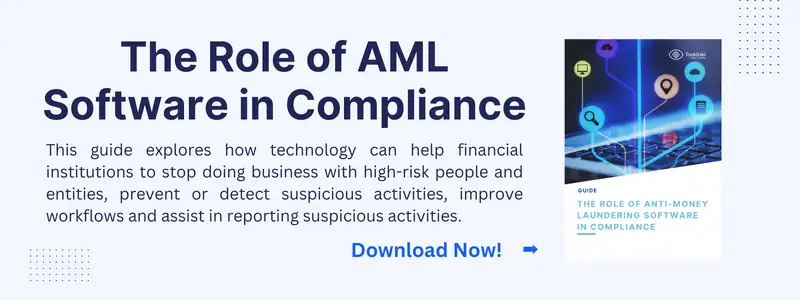The Cost of Non-Compliance: Analyzing the S$2.5M Penalty on Swiss-Asia
In the intricate world of finance, compliance is not just a necessity but a cornerstone of operational integrity. The recent S$2.5 million penalty imposed by the Monetary Authority of Singapore (MAS) on Swiss-Asia Financial Services Pte. Ltd. (SAFS) underscores a harsh reality: the cost of non-compliance can extend far beyond financial penalties, bleeding into reputational damage and trust erosion. This case emphasises the crucial lesson for all financial institutions: AML systems must evolve in tandem with business growth to effectively manage emerging risks.
This blog post aims to dissect the MAS' findings against SAFS, explore the regulatory environment that framed these breaches, and illustrate how proactive, technology-driven compliance measures can shield institutions from similar fates.
The Case of Swiss-Asia Financial Services
Swiss-Asia Financial Services, a wealth and fund management company, faced a severe setback when the Monetary Authority of Singapore levied a substantial S$2.5 million penalty for multiple breaches of AML/CFT regulations. This penalty stemmed from a detailed inspection that revealed a series of compliance failures over a significant period, from September 2015 to October 2018, during which the company experienced considerable growth.
The MAS outlined several specific deficiencies in SAFS’ compliance framework:
- Enterprise-wide risk assessment (EWRA) inadequacies: SAFS failed to take into account certain relevant risk factors relating to the company’s customers and business activities.
- Customer Due Diligence (CDD) failures: The company established business relations with customers before completing necessary CDD measures, contrary to regulatory expectations.
- Inadequate monitoring of third-party transactions: There was a failure to scrutinize multiple transactions that were inconsistent with what was known about the customers.
- Misidentification of high-risk customers: SAFS did not identify a number of customers as high-risk despite clear red flags, thereby failing to perform enhanced CDD.
- Neglect in suspicious transaction reporting: The company failed to submit suspicious transaction reports despite having sufficient grounds to suspect financial crime.
- Absence of Regular Internal Audits: There was no systematic internal audit process to evaluate the effectiveness of the AML/CFT controls, a critical oversight during periods of rapid business growth.
These breaches were not just administrative oversights but indicated a fundamental disconnect between SAFS' operational practices and the rigorous standards set forth by MAS. The MAS also reprimanded SAFS' CEO, Mr. Olivier Pascal Mivelaz, and COO, Mr. Steve Knabl, highlighting the responsibility of top executives to ensure their institutions comply with AML/CFT regulations.
Delving Deeper into the Red Flags
The SAFS case illuminates a series of red flags that were either overlooked or misjudged, highlighting gaps in transaction and process-level monitoring:
- Bearer Share Ownership: Ownership of bearer shares was a significant red flag. Bearer shares allow for anonymity as they are owned by the holder of the physical stock certificate, making it difficult to trace the actual owner. This anonymity is a substantial risk factor for money laundering activities.
- Inconsistent Transactions: The lack of scrutiny over transactions inconsistent with customer profiles suggests a gap in transaction monitoring systems. Effective systems should flag transactions that deviate from a customer's established pattern of behavior.
- Delayed CDD and EDD: Engaging with customers before completing CDD and enhanced due diligence (EDD) for high-risk clients exposed the firm to unknown risks. EDD is crucial for understanding the source of funds and the nature of the client's wealth, especially when dealing with high-net-worth individuals.
- Failure to Report: Not reporting suspicious activities despite clear indications (e.g., news reports of a customer's involvement in financial crimes) points to a failure in both the decision-making process and the transaction monitoring systems.
The Imperative of Adaptive AML/CFT Controls
This enforcement action by MAS serves as a potent reminder of the dire consequences of non-compliance and the imperative for financial institutions to continuously adapt their AML/CFT frameworks. As the financial landscape evolves and businesses expand, the systems in place to prevent financial crime must not only keep pace but anticipate potential challenges, ensuring robust defences against the sophisticated tactics of modern financial criminals. The message is clear: regulatory compliance is not just a legal requirement but a critical component of sustainable business growth and reputation management.
The Role of Technology in Ensuring Compliance
In today’s fast-evolving financial landscape, relying on traditional methods for compliance monitoring is both inefficient and risky. Technology plays a pivotal role in enhancing the effectiveness and efficiency of compliance programs. Tookitaki’s suite of compliance solutions demonstrates how leveraging advanced technology can prevent the kinds of breaches experienced by Swiss-Asia Financial Services.
Final Thoughts
The S$2.5 million penalty imposed on Swiss-Asia Financial Services by the Monetary Authority of Singapore is a compelling reminder of the critical importance of compliance. It highlights the substantial financial and reputational risks that institutions face when they fail to meet regulatory standards. As demonstrated by Tookitaki's innovative compliance solutions, technology plays a crucial role in ensuring that financial institutions can navigate the complexities of modern financial regulations effectively. Adopting advanced compliance systems is imperative for institutions that wish to safeguard themselves against the consequences of non-compliance and thrive in a regulated financial environment.
We invite readers to consider how their own institutions can benefit from the enhanced compliance capabilities provided by Tookitaki. For more information or to request a demo of our solutions, please contact us.
Anti-Financial Crime Compliance with Tookitaki?





